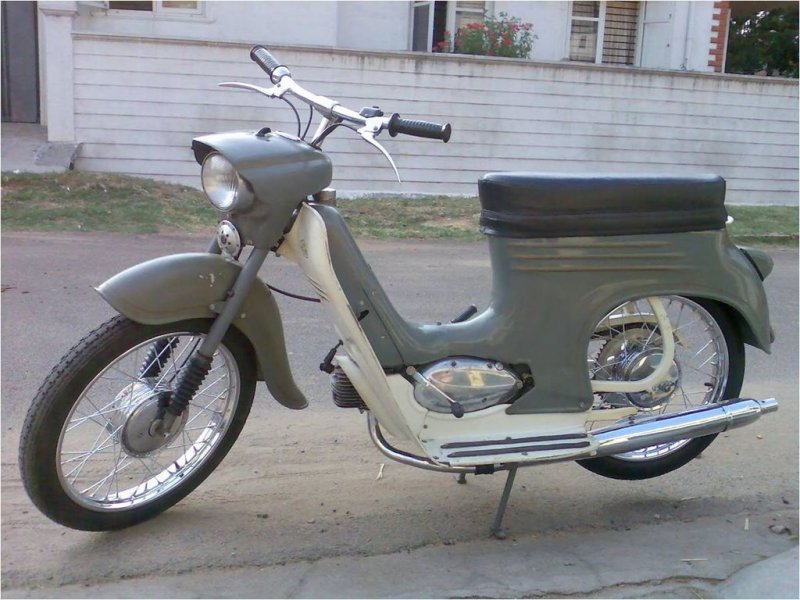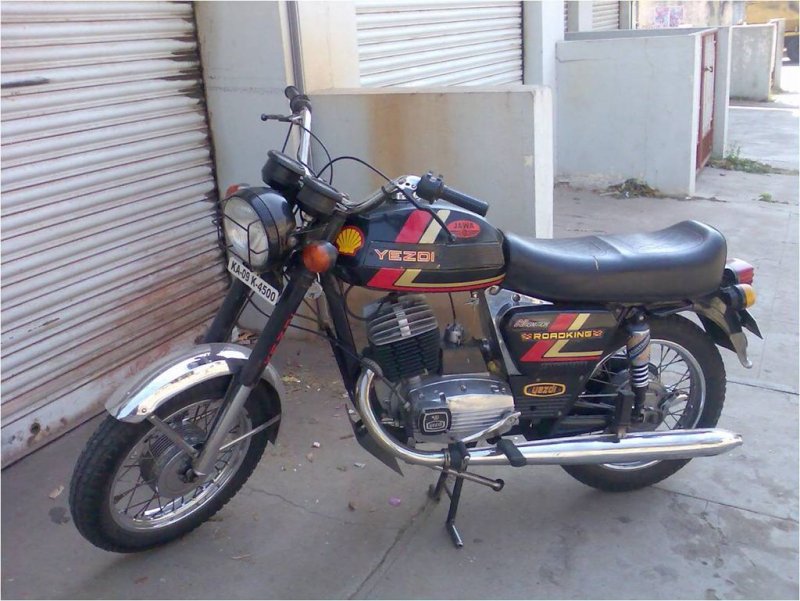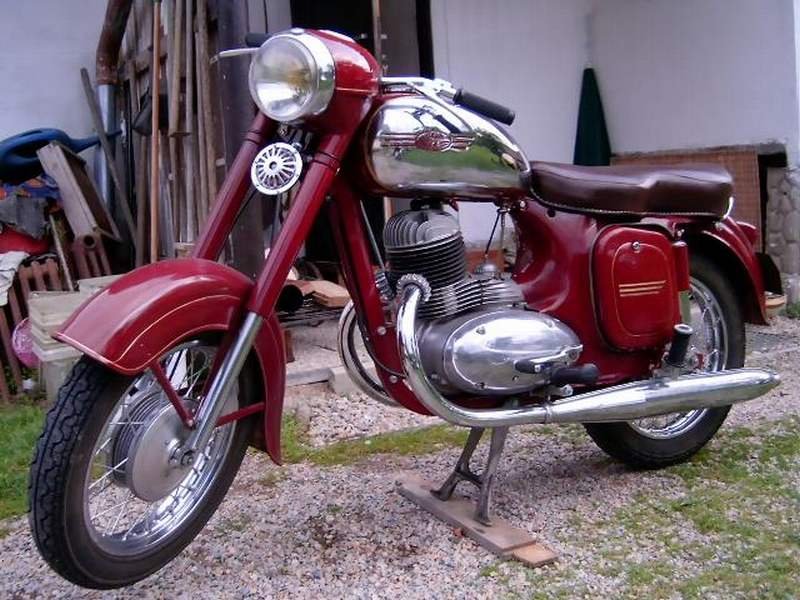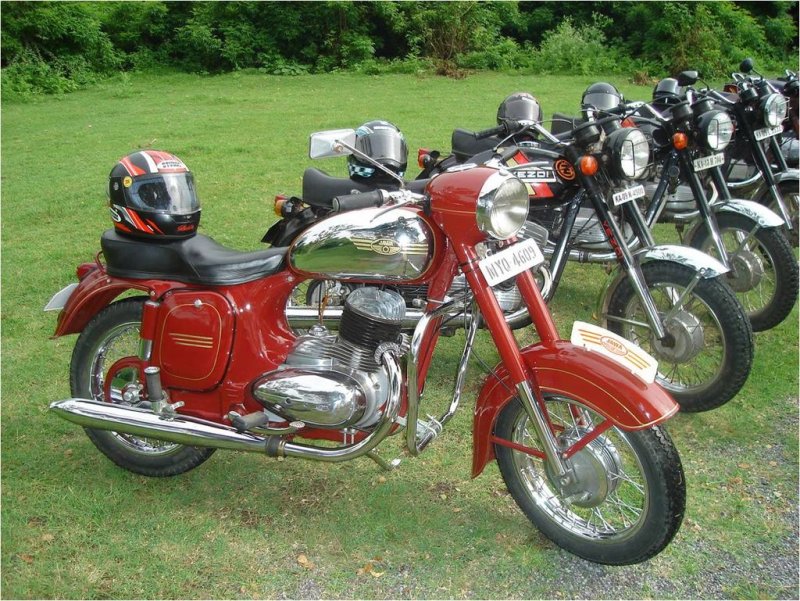Thread Starter
#1
Born in the 70's this was one iconic bike we would see often on the roads back then. The Roar it gave sure made some head's turn. Such was the charisma of this bike. It was also the bike i learned how to drive a Motorbike. Sad it turned into a history but a history loved by many. Even now there are many who would give up everything just to ride the bike once again. its the good old our very own YEZDI. Not many have written about it. so thought why not pen down a bit of history about this Roaring King . Hope you like it. Hope this thread gets the encouragement this bike deserved.
Ideal Jawa (India) Ltd was an Indian motorcycle company based in Mysore which sold licensed Jawa and ČZ motorcycles beginning in 1960 under the brand name Jawa and later Yezdi. The catchphrase for the bikes sold by the firm was "Forever bike forever value"
Jawa motorcycles were introduced in India in 1960 and they have a cult following to this present day. Production was carried out directly in India by Ideal Jawa India Ltd based out of Mysore. The Jawa 353/04 designated as 'A' Type, Yezdi 250 'B' Type, Jawa 350 type 634 Twin and Yezdi 250 Monarch models are driven to this day in various parts of the country. Jawa and Yezdi bikes, especially the ones with fuel tank paddings and ignition systems on the fuel tank are now collector’s items. The company stopped production in 1996.
IDEAL JAWA (INDIA) LIMITED popularly known as JAWA started operations in the year 1960 with the main objective to manufacture motorcycles among other things. The idea was to deliver to the consumers a product that defined value for money.
The logo "ForEver Bike ForEverValue" very aptly signifies the ideology behind the product. This motive remains unchanged to this day, even in the face of stiff competition.
JAWA started commercial production of motorcycles in the year 1961 in technical colloboration with JAWA LIMITED of erstwhile Czechoslovakia and during the years 1961 to 1985 put up a good performance and achieved good profitability levels. The peak capacity utilisation was 85% with 36,000 vehicles on a capacity of 42,000 vehicles per annum. The collaboration agreement with JAWA of Czechoslovakia which, among other things ensured continuous availability of technical knowledge from the said collaborator ended in 1968, by which time JAWA had established an in house expertise for achieving wholly indigenous manufacturing technology and also design of vehicles known under the brand name of "YEZDI".
JAWA had established market and had brand loyalty in Southern, Western and Northern regions and till 1985-86, they were in the seller's market. It was now that there was an aggressive entry into the domestic market by Japanese technology backed vehicles of 100cc category which were more fuel efficient, with sophisticated design, and state-of-the-art technology. All these bikes, although made the selling of YEZDI motorcycles a difficult proposition, JAWA, however, withstood the competition and continued the production and sale of motorcycles with a niche market without losing the brand loyalty in most of the regions. This was achieved by two major features of YEZDIbikes, which are attributable to user friendly design, lower maintenance costs and attractive pricing. JAWA motorcycles are also sturdy and rugged which are particularly suitable for semi urban and rural users.
Models
There have been many models of this brand before the company shut its doors in 1996. Their various models included:
The 'A', 'B', 'C' & 'D' Types are the model of Engine that particular bike has.
Ideal Jawa also exported many of the above models to over 61 countries around the world including Turkey, Nigeria, Sri Lanka, Egypt and others. Guatemala was supplied with custom White Yezdi Roadkings for their Police forces. A model exported to Venezuela was called the Yezdi 250 MT (Mountain Terrain).
Ideal Jawa (India) Ltd is located in Mysore, situated in the southern part of India in the state of Karnataka. After Bangalore, Mysore is the next most prominent and advanced city of Karnataka in almost all the aspects. It is well connected with other cities either by direct routes,connecting trains or by air via Bangalore.
The company is built on spacious premises with the total area [land] of the complex is little over 26 acres. The Administrative/Production blocks cover an area of 33,468 square meters while the Utilities/Services Blocks cover an area of 35,846 square meters. The factory is housed in two buildings. The older factory, set up in 1960, has facilities for manufacture of components for 250cc motorcycles and its assembly. The second, more recent building, houses the facilities for manufacture of components for the 60cc and the 350cc motorcycles along with their assembly lines.
End of production
When the company was forced to shut down, it was producing the 175, Monarch, Deluxe, Road Kings and CL II. The main reason for the company's collapse was labor trouble and increasing levels of pollution control norms which were making the two stroke bikes that the company produced obsolete.










Ideal Jawa (India) Ltd was an Indian motorcycle company based in Mysore which sold licensed Jawa and ČZ motorcycles beginning in 1960 under the brand name Jawa and later Yezdi. The catchphrase for the bikes sold by the firm was "Forever bike forever value"
Jawa motorcycles were introduced in India in 1960 and they have a cult following to this present day. Production was carried out directly in India by Ideal Jawa India Ltd based out of Mysore. The Jawa 353/04 designated as 'A' Type, Yezdi 250 'B' Type, Jawa 350 type 634 Twin and Yezdi 250 Monarch models are driven to this day in various parts of the country. Jawa and Yezdi bikes, especially the ones with fuel tank paddings and ignition systems on the fuel tank are now collector’s items. The company stopped production in 1996.
IDEAL JAWA (INDIA) LIMITED popularly known as JAWA started operations in the year 1960 with the main objective to manufacture motorcycles among other things. The idea was to deliver to the consumers a product that defined value for money.
The logo "ForEver Bike ForEverValue" very aptly signifies the ideology behind the product. This motive remains unchanged to this day, even in the face of stiff competition.
JAWA started commercial production of motorcycles in the year 1961 in technical colloboration with JAWA LIMITED of erstwhile Czechoslovakia and during the years 1961 to 1985 put up a good performance and achieved good profitability levels. The peak capacity utilisation was 85% with 36,000 vehicles on a capacity of 42,000 vehicles per annum. The collaboration agreement with JAWA of Czechoslovakia which, among other things ensured continuous availability of technical knowledge from the said collaborator ended in 1968, by which time JAWA had established an in house expertise for achieving wholly indigenous manufacturing technology and also design of vehicles known under the brand name of "YEZDI".
JAWA had established market and had brand loyalty in Southern, Western and Northern regions and till 1985-86, they were in the seller's market. It was now that there was an aggressive entry into the domestic market by Japanese technology backed vehicles of 100cc category which were more fuel efficient, with sophisticated design, and state-of-the-art technology. All these bikes, although made the selling of YEZDI motorcycles a difficult proposition, JAWA, however, withstood the competition and continued the production and sale of motorcycles with a niche market without losing the brand loyalty in most of the regions. This was achieved by two major features of YEZDIbikes, which are attributable to user friendly design, lower maintenance costs and attractive pricing. JAWA motorcycles are also sturdy and rugged which are particularly suitable for semi urban and rural users.
Models
There have been many models of this brand before the company shut its doors in 1996. Their various models included:
- Jawa 250 typ 353/04 Kyvacka called 'A' Type (under licence)
- Jawa 50 Jet 'A' Series known as Pionyr typ 555 in Czechoslovakia (under licence)
- Yezdi 60 Jet 'B' Series
- Yezdi 250 'B' Type
- Yezdi 250 Oilking (CB Points and Oil Pump) 'C' Type
- Yezdi 250 Road king (CB Points) 'C' Type
- Yezdi 60 Jet 'C' Series
- Yezdi D250 Classic 'D' Type
- Yezdi 250 CL II 'D' Type
- Yezdi B250 Deluxe 'D' Type
- Yezdi 250 Deluxe 'D' Type
- Yezdi 250 Road king (CDI) 'C' Type
- Yezdi 60 Colt
- Yezdi 60 Colt Deluxe
- Yezdi 175 (CB Points)
- Yezdi 175 Deluxe (CDI)
- Jawa / Yezdi 350 Twin (typ 634)
- Yezdi 250 Monarch 'C' Type
- Yezdi 250 Supersprint (never released)
The 'A', 'B', 'C' & 'D' Types are the model of Engine that particular bike has.
Ideal Jawa also exported many of the above models to over 61 countries around the world including Turkey, Nigeria, Sri Lanka, Egypt and others. Guatemala was supplied with custom White Yezdi Roadkings for their Police forces. A model exported to Venezuela was called the Yezdi 250 MT (Mountain Terrain).
Ideal Jawa (India) Ltd is located in Mysore, situated in the southern part of India in the state of Karnataka. After Bangalore, Mysore is the next most prominent and advanced city of Karnataka in almost all the aspects. It is well connected with other cities either by direct routes,connecting trains or by air via Bangalore.
The company is built on spacious premises with the total area [land] of the complex is little over 26 acres. The Administrative/Production blocks cover an area of 33,468 square meters while the Utilities/Services Blocks cover an area of 35,846 square meters. The factory is housed in two buildings. The older factory, set up in 1960, has facilities for manufacture of components for 250cc motorcycles and its assembly. The second, more recent building, houses the facilities for manufacture of components for the 60cc and the 350cc motorcycles along with their assembly lines.
End of production
When the company was forced to shut down, it was producing the 175, Monarch, Deluxe, Road Kings and CL II. The main reason for the company's collapse was labor trouble and increasing levels of pollution control norms which were making the two stroke bikes that the company produced obsolete.










Last edited by a moderator:


![Clap [clap] [clap]](https://www.theautomotiveindia.com/forums/images/smilies/Clap.gif)
![Smile [:)] [:)]](https://www.theautomotiveindia.com/forums/images/smilies/Smile.gif)
![Surprise [surprise] [surprise]](https://www.theautomotiveindia.com/forums/images/smilies/Surprise.gif) , the website still exists even after almost 20 years (from the time the company shut its doors!)!!!
, the website still exists even after almost 20 years (from the time the company shut its doors!)!!!![Laugh [lol] [lol]](https://www.theautomotiveindia.com/forums/images/smilies/Laugh.gif)